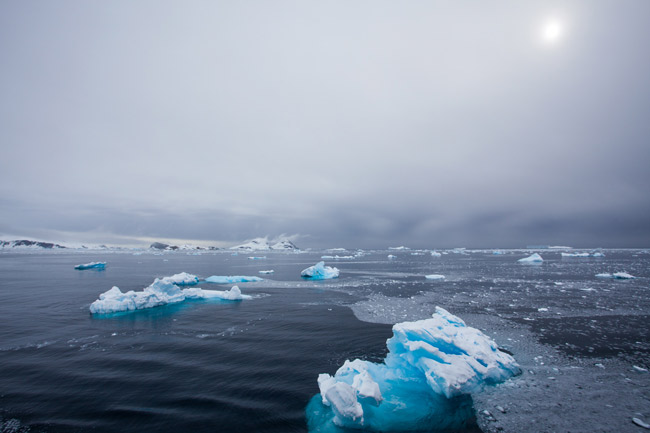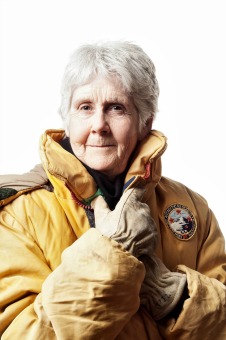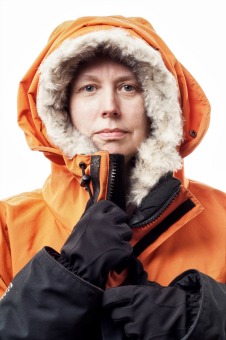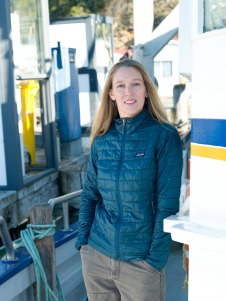
Antarctica blue ice. Photo: Anne Dirkse.

Professor Pat Langhorne.
A global 'Wikibomb' that aims to blow up the perception Antarctic science is a boy's club includes three Otago academics in its list of world-leading female scientists.
Physics' Professor Pat Langhorne, Dean of the National School of Surveying Professor Christina Hulbe, and Marine Science's and Geology's Dr Christina Riesselman are in the Woman of the Antarctic Wikibomb that aims to tell the world about the many great — and generally under-recognised — female role models involved in Antarctic research.
A Wikibomb is like a weather-bomb, but with pages of information instead of rain. It is hosted via Wikipedia and contains profiles of about 100 top female scientists from 30 countries – including ten from New Zealand.
The team of international scientists behind Wikibomb says: "It is important that senior women scientists are visible to younger female scientists so they know that careers in science are possible - You can't be what you can't see."

Professor Christina Hulbe.
The Wikibomb profiles will be officially unveiled on Tuesday during the Scientific Committee on Antarctic Research (SCAR) biennial Open Science Conference, which is in Kuala Lumpur, Malaysia.
When SCAR invited its community to nominate past and present influential female Antarctic researchers — and those supporting research — for the Wikibomb, it received 170 nominations from 30 countries.
New Zealand Association of Scientists President Dr Craig Stevens says: "It is vital we give the next generation of scientists, both male and female, a true sense of who does Antarctic research. Women have been playing an increasing role in Antarctic research since the 1950s."
"The time has come for them to gain far greater public recognition. Methods of communicating are changing and the Wikibomb taps into this. It's challenging enough dealing with funding, the weather and drifting sea ice — there should be no other limits on achievement."

Dr Christina Riesselman.
Leading Palaeobotanist Dr Marie Stopes was rejected for Scott's historic 1910 expedition to the South Pole, then soon afterwards 1300 women applied for another British Antarctic Expedition and none was accepted.
But Dr Strugnell says there has been a lot of high-impact research and leadership by women in Antarctic science during the past 10 years.
For example, women lead both Germany's Institute for Polar and Marine Research, and the British Antarctic Survey. Korea also recently appointed its first female Antarctic station leader, and a previous Chief Executive of Antarctica New Zealand, Gillian Wratt, has a profile on Wikibomb as well.
The Wikipedia expert on the international scientists' team, Dr Thomas Shafee, says Wikipedia is now the world's most widely viewed reference site. When it began, less than 10 per cent of scientists featured on Wikipedia were women, now that number is just over 16 per cent, but "despite such heroic efforts, it's still an up-hill battle."
The Wikibomb project is part of the global Athena Swan Charter for advancing the careers of women in science, technology, engineering, maths and medicine.
There is more …
Professor Christina Hulbe is giving one of four named lectures at the Scientific Committee on Antarctic Research's biennial Open Science Conference next week, where she will be addressing about 1000 people. Her Weyprecht Lecture is about The Ross Ice Shelf: 190 years (or more) of exploration.
Professor Pat Langhorne has received an Ice Research and Engineering Award from the International Association for Hydro-Environment Engineering and Research (IAHR).
The award recognises her influential work on the fundamental physics of sea ice formation, crystal structure growth, sea ice growth, and the physical properties of sea ice, especially around Antarctica. The award also acknowledges her long service to the IAHR Ice Research and Engineering Committee.
For more information about SCAR's efforts in promoting Women in Antarctic Research and the Wikibomb event and profiles of female scientists: http://www.scar.org/outreach/women
